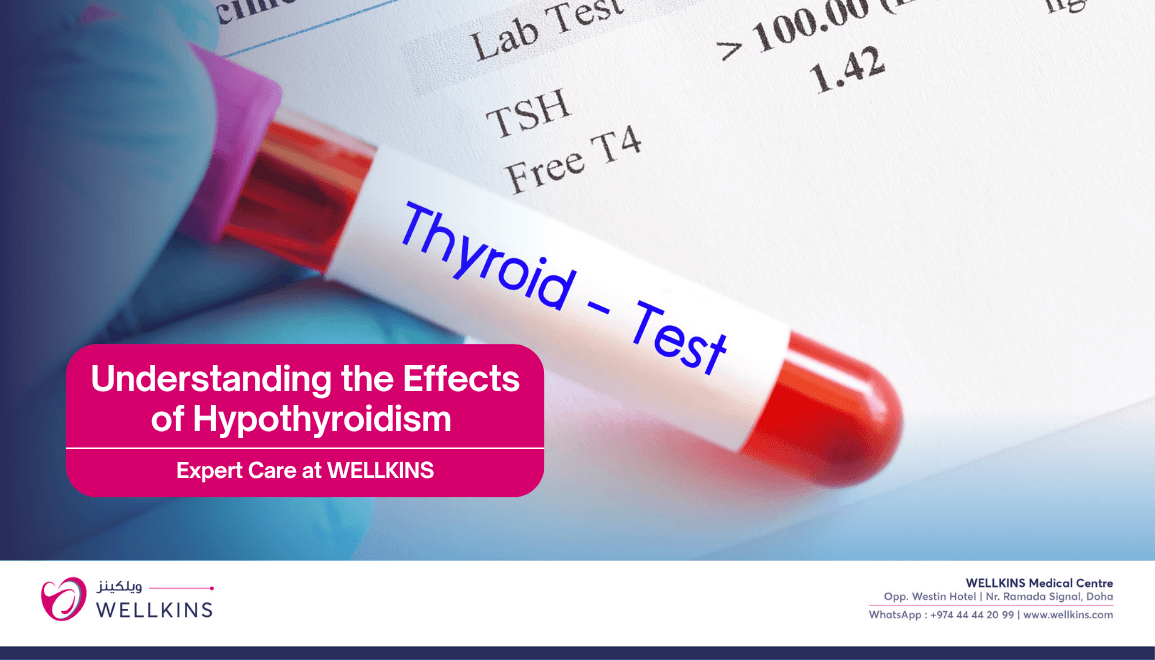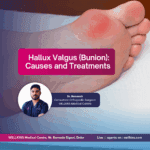Author: Dr. Jacob Neil (Consultant – Internal Medicine – Wellkins Medical Centre)
Hypothyroidism, or an underactive thyroid, is a common condition where the thyroid gland doesn’t produce enough essential hormones (T3 and T4). Since these hormones regulate nearly every process in the body, low levels can lead to a systemic slowdown, affecting everything from your energy and mood to your heart and digestion. At Wellkins Medical Centre, we provide complete care for thyroid disorders, emphasizing that effective management combines precise medication with informed lifestyle choices. Understanding how this condition affects your body and what you can do every day is crucial for feeling your best.
“Managing hypothyroidism is a lifelong commitment, not a temporary fix. Success depends entirely on adherence to personalized dosing and regular follow up testing. Continuous monitoring of TSH levels is non-negotiable to prevent both over- and under treatment. This is potent hormonal therapy; precision and consistency are essential.”
Understanding the Effects of Hypothyroidism
Because the thyroid affects all major systems, symptoms can be widespread and often mimic other conditions. Recognizing these effects is the first step toward getting the right diagnosis and treatment.
Part of the Body | Possible Effects |
|---|---|
Energy & Metabolism | Feeling very tired, always cold, gaining weight easily, dry skin, hair loss, puffy face or hands |
Neck / Throat | Swelling in the neck (goiter), tight feeling, sometimes trouble swallowing |
Heart & Blood | Slow heartbeat, higher blood pressure, higher cholesterol (can affect the heart over time) |
Mind & Nerves | Feeling low or depressed, forgetfulness, trouble focusing (“brain fog”), tingling or numb hands/feet |
Muscles & Joints | Achy muscles, stiff joints, cramps, carpal tunnel (numbness in hands) |
Periods & Fertility | Heavy or irregular periods, difficulty getting pregnant, higher chance of miscarriage if not treated |
Skin, Hair, Nails | Dry or pale skin, thinning hair (especially outer eyebrows), brittle nails, swelling in feet/hands |
Stomach & Bowels | Constipation, bloating, slow digestion |
Other Conditions | Sometimes linked with other immune problems (like diabetes, celiac disease, or vitiligo) |
If Untreated for a Long Time
While rare, severely low thyroid function can lead to life-threatening conditions like myxedema coma (a very severe low thyroid state) and a very small risk of thyroid cancer (lymphoma).
Helpful Habits: Supporting Your Thyroid Health
- Balanced meals: lean protein, fruits, vegetables, whole grains, nuts, and seeds.
- Cooked cruciferous veggies (broccoli, cauliflower, kale, cabbage) – safe when cooked.
- Omega-3 rich foods: salmon, sardines, flaxseeds, chia seeds (reduce inflammation).
- Moderate iodine (iodized salt is usually enough; don’t take extra unless doctor prescribes).
- Selenium-rich foods: Brazil nuts (1–2 nuts/day), sunflower seeds, eggs – support thyroid.
- Calcium & Vitamin D (dairy, fortified milk, sunlight, or supplements if prescribed).
- Iron-rich foods: lean meat, beans, spinach – but take separately from thyroid pills.
- Plenty of water to support digestion and metabolism.
- Good sleep (7–9 hours) for hormone balance.
- Regular exercise (walking, yoga, swimming, light weights) to boost mood and metabolism.
- Stress control: meditation, deep breathing, hobbies.
Medication is essential, but diet and lifestyle choices play a vital role in optimizing hormone absorption, managing symptoms and supporting overall metabolism.

Things to Limit or Avoid
Properly taking your medication and avoiding substances that interfere with its absorption or negatively affect your thyroid are critical for symptom control.
- Skipping medication – always take thyroid pills as prescribed.
- Taking thyroid pills with food/coffee – wait 30–60 min before eating.
- Iron, calcium, or antacids close to thyroid pill – take them at least 4 hours apart.
- Too much iodine (kelp, seaweed supplements, iodine drops).
- Highly processed foods (fast food, packaged snacks, sugary drinks).
- Too much raw cruciferous vegetables (if you eat a lot, cook them first).
- Soy products near pill time (tofu, soy milk – can block absorption).
- Smoking & excess alcohol – worsen inflammation and hormone imbalance.
- Chronic stress & sleep loss – make symptoms worse.
Quick Tips for Daily Success
- Take your thyroid pill first thing in the morning with water.
- Wait 30–60 min before eating breakfast or drinking coffee.
- Keep meals simple, whole, and natural.
- Check regularly with your doctor for blood tests and medication adjustment.

Hypothyroidism is a condition that requires long-term attention, but with consistent treatment and informed lifestyle choices, you can effectively manage your symptoms and regain your quality of life. The key to successful management lies in precise medication adjustment and dedicated self-care. At Wellkins Medical Centre, we provide the necessary inclusive blood tests and expert consultation to accurately diagnose your condition, fine tune your medication dosage and create a personalized plan that integrates healthy habits into your daily routine. Don’t let the sluggishness of an underactive thyroid define your days; we are here to help you restore your energy and vitality.
To book an appointment at Wellkins Medical Centre: https://wellkins.com/visit







